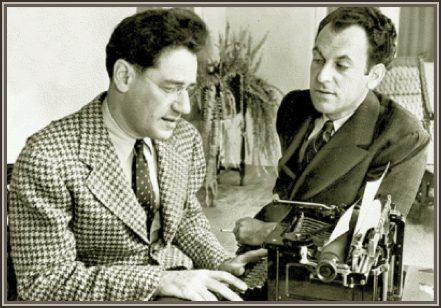Satchmo at the Waldorf closes in Orlando on Sunday afternoon. Would that I were there! Not surprisingly, the experience of writing my first play and seeing it onto the stage has inspired me to write a “Sightings” column in which I talk about some of the things I learned along the way. Here’s an excerpt.
* * *
Tony Kushner can’t make a living writing for the stage. America’s most prominent playwright confessed in an interview published in Time Out New York earlier this year that “Angels in America” doesn’t pay the rent: “I make my living now as a screenwriter! Which I’m surprised and horrified to find myself saying, but I don’t think I can support myself as a playwright at this point. I don’t think anybody does.” So far as I know, Mr. Kushner is right. I don’t know of any American playwrights who earn the bulk of their living writing plays. Many of the older ones teach, while a growing number of younger ones write for series TV. Itamar Moses, for instance, has written for “Boardwalk Empire” and “Men of a Certain Age,” which isn’t stopping him from turning out stage plays (his latest effort, “Completeness,” just closed Off Broadway).
The question all but asks itself: Why is anybody still writing plays? Theater, after all, is no longer a central part of the American cultural conversation, the way it was when Arthur Miller and Tennessee Williams walked the earth. Nowadays most educated people would just as soon stay home and watch “Breaking Bad” as shell out a hundred bucks to see a Broadway play–assuming that there are any plays on Broadway worth seeing, which long ago ceased to be a safe bet.
So if you can’t make any money writing for the stage, why bother? Putting aside the obvious attraction of being able to make up your own characters, I can think of one excellent reason: You meet the nicest people.
 You’ve probably never thought about it before unless you happen to write for a living, but professional writers are doomed to spend most of their waking hours sitting by themselves at a desk, staring at a blank computer screen and waiting for lightning to strike. It’s a lonely business, which explains why a few authors choose to collaborate instead of flying solo. Moss Hart, who wrote his best plays in partnership with George S. Kaufman, explained his decision to write with a partner in “Act One,” his 1959 autobiography: “The hardest part of writing by far is the seeming exclusion from all humankind while work is under way, for the writer at work cannot be gregarious….Collaboration cuts this loneliness in half. When one is at a low point of discouragement, the very presence in the room of another human being, even though he too may be sunk in the same state of gloom, very often gives that dash of valor to the spirit that allows confidence to return and work to resume.”
You’ve probably never thought about it before unless you happen to write for a living, but professional writers are doomed to spend most of their waking hours sitting by themselves at a desk, staring at a blank computer screen and waiting for lightning to strike. It’s a lonely business, which explains why a few authors choose to collaborate instead of flying solo. Moss Hart, who wrote his best plays in partnership with George S. Kaufman, explained his decision to write with a partner in “Act One,” his 1959 autobiography: “The hardest part of writing by far is the seeming exclusion from all humankind while work is under way, for the writer at work cannot be gregarious….Collaboration cuts this loneliness in half. When one is at a low point of discouragement, the very presence in the room of another human being, even though he too may be sunk in the same state of gloom, very often gives that dash of valor to the spirit that allows confidence to return and work to resume.”
To be sure, most playwrights, unlike Hart, write by themselves. Once a script is finished, though, they immediately plunge themselves into the endlessly pleasurable frenzy of a collaborative enterprise….
* * *
Read the whole thing here.
Terry Teachout on the arts in New York City
